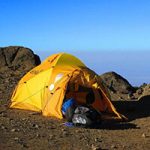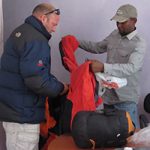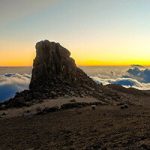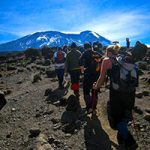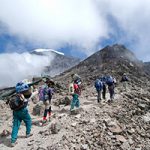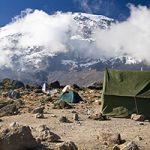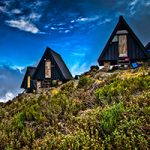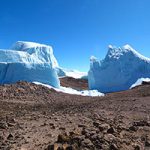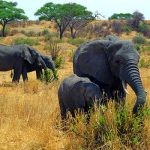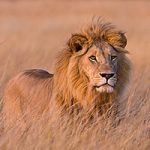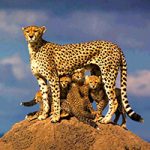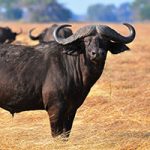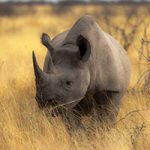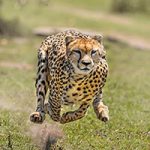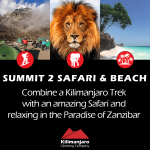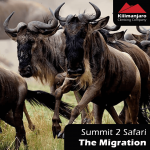FAQ's
Read our Kilimanjaro Frequently Asked Questions
Drawn from our years of experience in running treks to Kilimanjaro and questions asked by our previous guests, we have compiled a list of Kilimanjaro Frequently Asked Questions to help you plan your trek
Although we run treks all year round, typically, the months of January & February and also September & October are considered to be the best months in terms of dry weather and moderate temperatures. June to August are also good months in terms of dry weather but temperatures will be much cooler.
Tanzania has two "rainy seasons" - the "short rains" during November and December and the "long rains" during March to the end of May. These are the rainiest months and climbing conditions are not as favourable. We recommend climbing via the Rongai Route in the wetter months, since the northern side of the mountain receives less precipitation. Read more here
Treks range from 5 to 9 days, depending on which one of the 6 official routes you use to climb Kilimanjaro. The Marangu Route is the shortest and can be completed in 5 days but it has the lowest summit success rate. The reason for this is mainly due to the lack of opportunity for the body to acclimatize to the high altitude.
In essence, the longer the climb, the better the chances are of summiting - Acclimatization is achieved by spending more time on the mountain. Opting for a shorter route may seem like a good idea to save on expenses, but in reality you are simply significantly reducing your chances of a reaching the summit.
There are six official routes to climb Kilimanjaro which vary in length and difficulty. Unless you have a specific route in mind we would suggest you consider one of the following 4 routes while baring in mind the difficulty of the route and that longer routes have a higher summit success rate.
If you don`t have a lot of time and want the best chance of success then this is a great choice.
Starting to the south-west of Kilimanjaro it circuits south before climbing to Uhuru Peak via Stella Point. With excellent acclimatisation and varied and interesting scenery every day it is a great choice for the novice climber.
Lemosho 8 Day
Approaching from the west, the Lemosho route is one of our highly recommended routes. The first three days of the ascent are quiet and relatively untravelled, then on day four it joins the busy Machame route. A wonderful route in terms of scenery, it offers unequalled views over the majestic Shira plateau. The success rate for this route is comparable to the Machame route.
The Rongai route approaches Mount Kilimanjaro from the north east, near the border of Kenya and Tanzania. Its main attraction is that it is very quiet and traverses virtually untouched wilderness. Ascent is via the scree path to Gilman’s Point with a traverse round the rim to Uhuru Peak. Descent is along the Marangu route. If you are planning your trek during the months of April, May, and November you may want to consider the Rongai Route. This route tends to have less rainfall as it approaches from the Northern side of the Mountain.
The Northern Circuit route is the newest officially approved route up Mount Kilimanjaro, and one of the few ways to see its quieter, more remote northern slope. This is an extended, nine day climb which offers excellent acclimatisation time and provides views of the rugged and highly varied countryside on all sides of the great mountain.
They are all great treks in terms of acclimatisation and scenery which also increases the chance of a successful summit.
At 5.895 meters high and approximately 70 miles wide by 47 miles long! Kilimanjaro is an imposing landmass that supports five diverse ecological zones with varying temperatures and a vast amount of plant and animal life. Whilst on your trek you will go through all the climate zones on your way to the summit.
At the base of the mountain the temperatures are usually between 70°F and 80°F. which rapidly decrease as you gain altitude and pass through the different zones. The night temperatures on Uhuru peak can drop to -10°F. At high altitude the weather conditions can change rapidly and it is best to be prepared for extreme conditions.
Download our KCC Equipment List
- Four season sleeping bag suitable for conditions reaching – 10 to -15 Celcius, sleeping mattress and small travel pillow
- Daypack (25-30 litres) and waterproof cover
- Large duffel bag to be carried by your porter
- Small & medium ziplock bags and plastic garbage bags. Ziplock bags are handy for a multitude of uses and large plastic bags for dirty clothes, gear, etc.
- Headlamp (bring spare batteries and spare bulb)
- Insulated water bottle or Camel Back/Platypus (the latter is recommend as it is easier to access and you will drink more frequently)
- Telescopic trekking poles
- Sunglasses
- Camera and/or video camera and extra memory cards and battery (note battery life is much shorter under freezing conditions)
- Earplugs (busy camps can be noisy)
- Pocket Knife
- Stuff sacks for sleeping bag and clothing
- Travel book, novels, deck of cards or other games for afternoon entertainment
CLOTHING:
- Waterproof trekking boots, well broken in & gators
- Extra shoes, like gym shoes or flip flops to where in camp
- Thick thermal outer socks and inner lining socks
- Waterproof/windproof breathable trousers (side zipper recommended)
- Hiking pants (convertible to shorts)
- Base layer or thermal long underwear
- Underwear, bras
- Waterproof outer gloves and inner liner gloves
- Waterproof/windproof insulated jacket
- Thick sweater or fleece top
- Base layer or thermal long sleeve shirt
- Long sleeved, light weight, moisture wicking shirt
- T-shirt
- Poncho
- Scarf for cold and bandana for dust
- Wide brimmed hat for the sun
- Toque and balaclava
- Extra shoeslaces for your hiking boots
TOILETRIES:
- Toilet paper
- Kleenex or facial tissue
- Sun block
- Lip balm with sun protection
- Skin lotion (the cold and wind will dry your skin more than usual)
- Wet wipes
- Small soap
- Travel towel – light-weight and takes very little space
- Toothbrush, toothpaste, dental floss
- Deodorant
- Insect repellent
- Nail clippers/scissors
- Razor & shaving cream/gel
- Contact lens solution & extra set of lenses
- Feminine hygiene product
FIRST AID:
- High altitude medication
- Anti malarial medication
- Band aids & moleskin for blisters
- Bandages, gauze pads
- Painkiller (Tylenol, Ibuprofen)
- Antiseptic cream (Polysporin)
- Stomach ache/indigestion medicine (Pepto Bismol)
- Anti-diarrhea medicine (Imodium)
- Re-hydration salts
- Prescription antibiotic effective against a broad range of bacteria including travelers diarrhea (Ciprofloxacin)
- Any other prescription medications
- Sterile syringes & needles
- Eye rinse/moisturizing drops
MONEY & DOCUMENTS:
- Passport
- Plane tickets
- Travel Insurance Policy & Emergency Contact Number
- Yellow Fever Vaccination Certificate (if applicable)
- List of Emergency Contact Number from home
- U.S. dollars in large and small denominations ($20, $50 & $100 bills should be issued after 2003)
- Credit cards and ATM bank cards
- Medical history
Avoid over packing and bring only what you need. Porters are restricted to carrying 15 kilograms of your personal belongings. If your duffel is overweight, you will need to hire and pay for an additional porter.
All extra luggage items you will not use on your climb, such as clothing, gear and equipment for safari or Zanzibar can be safely stored at the hotel.
It can happen that checked luggage on international airlines is lost or delayed. We therefore recommend that you wear or carrying on items which are absolutely essential to your Kilimanjaro climb, i.e., one complete hiking outfit including your hiking boots. In your carry on baggage, make sure you should bring your toiletries, medications, camera and all important documents.
Pack items that you may need during the day until you reach your next camp. This may vary from day to day depending on trail conditions & weather. Each morning our mountain guides will recommend what you should wear and pack. Typically such items may include rain gear at the lower altitude, warm clothing & gloves at higher altitude, snacks, hat, sunglasses, sunscreen, lip balm, camera gear, drinking water, lunch and all important documents including your passport and cash. The rest of your equipment will be taken to the next camp by our porters.
Items & Services Provided for the Trek
The items and services listed below are included as standard on all out fixed date and private climbs.
Accommodation & Logistics
• Return airport transfer from Kilimanjaro International Airport to the hotel.
• Two nights bed and breakfast hotel accommodation at the hotel based on twin occupancy.
• Return transfer from the hotel to the gate
• Return transfer from gate to the lodge.
• Excess gear storage at your lodge
• A KCC liaison officer on standby should you require anything during your stay in Arusha
On the mountain
• An expedition briefing prior to leaving for the mountain
• Kilimanjaro park entry permits and park camping permits
• Mountain rescue permit
• Staff wages
• Bilingual guides
• Expedition porters and cooks
• Hot breakfast, a hot lunch, a hot evening meal and snack food available at camp
• Boiled water for drinking and washing
• Private toilet tent
Safety and Equipment
• Helicopter evacuation registration fee
• Short wave radios, a satellite phone, large expedition first aid kit & Oximeter
• Medical oxygen and a means of evacuation from the mountain
• High quality sleeping tent
• Mess tent with tables and chairs
Items and services not included as standard
• Flights from your home country to Kilimanjaro International Airport
• Tanzanian entry visas
• Tips for mountain staff
• Drinks and food when not on the mountain
• All personal climbing equipment (equipment hire is available)
• All transport outside what is mentioned in the included section
You do not need to have any experience in technical mountaineering to successfully climb Kilimanjaro. You do need to be active and reasonably fit; committed to doing some training prior to the trip and determined mentally while on the climb. We recommend taking regular hikes prior to your trip as Kilimanjaro trails although non-technical can be steep in places. The main reason people do not summit is not lack of fitness but altitude sickness.
Booking a trek with us can be done in the following ways:
Filling out the enquiry / booking form
e-mailing us at : info@kilimanjaroclimbingcompany.com
calling us on : +44(0) 7746 40 30 50 or +44 (0) 1704 574609
Once all your trek details have been discussed and agreed upon we will send you an invoice. Your booking will be secured upon payment of a 10% of the invoice value with the balance being paid in full 30 days prior to departure.
For your convenience we offer a variety of payment options. We can accept your payments by electronic bank transfer, wire transfer or credit card payment. Receipts for all payments are issued. All prices are subject to change.
Deposit
A non-refundable deposit of 10% of the quoted price is payable to confirm your booking and secure your Kilimanjaro climb.
Balance
The balance is payable at least 30 calendar days prior to the start of your trip.
Credit Card Payment
Once we have sent you the offer with an invoice number. If you would like to pay by credit card please fill in the form to your right with the invoice number and the amount to be paid.
- We accept Visa, MasterCard, Maestro & JCB
- All credit card transactions will incur a 2.5% surcharge.
- A link to a secure payment portal.
- Card payments of up to £ 5000 per transaction can be made.
- Please contact us with any questions or concerns.
Cancellation time scale and charges
- 7 days prior to departure 10% of total trip price incurred 48 hours to day of departure 25% of total trip price incurred.
- The trip will not be cancelled by us unless we are forced to do so because of unusual or unforeseeable circumstances such as a major natural disaster, major political unrest or war. If we cancel the tour we will promptly refund all payments made by you including the deposit. We shall not be liable to refund any additional expenses that you may have incurred (such as insurance, visas, vaccinations and other incidental costs).
- If greater than 7 days prior to the commencement date of the trip you need to re-schedule your trip due to unforeseen circumstances, we will accommodate this free of charge. 7 days to the day of departure we will re-schedule your trip but charges may be incurred for items already booked and paid for by the KCC.
Travel insurance is compulsory on all our treks. Many companies do not cover high altitude trekking, so it is important to read carefully the activities covered under a policy prior to purchasing it.
Some of the key inclusions you will require in your insurance policy are the following:
- Make sure your policy covers you for the altitude you will be visiting (6000m)
- The policy should cover you for evacuation by helicopter in case of emergency
- There should be adequate medical cover and cover for loss of equipment
We recommend travel insurance offered by World Nomads,
It is important, when choosing the company you climb with, to be happy with the package and service they provide. At Kilimanjaro Climbing Company we are also the ground operator for all our treks. When you book with us you only deal with us. Some climbing companies sub-contract their climbs to the ground operator with the lowest bid and therefore can have much lower standards. Basically you get what you pay for! At Kilimanjaro climbing company we provide experienced guides, porters and chefs. We ensure our staff have suitable clothing and shelter when on the mountain and our porters do not carry weight exceeding the weight guidelines stated by the Porters Association. We provide AMREF cover, which will evacuate any client via helicopter requiring urgent medical attention when on the mountain. We provide a private toilet which is included in the price for all our treks. (This may not seem too important when booking your trip however, you can be assured this will be a welcome luxury when on your climb!) Included in our price, which may not be automatically included in cheaper deals are; transfers to and from the airport and mountain, also, accommodation before and after your climb.
We will match any like for like trek price, providing the company offering the trek matches our own high standards. Please contact us if you would like to discuss this further.
On average 97 % of our trekkers successfully reach the summit. To optimise your chances of success Kilimanjaro Climbing Company will provide you with a sensible, gradual approach to your trek which provides time for acclimatisation. We also provide plenty of good food and water, excellent quality tents to rest in and even a private toilet for each trek. All of which contributes to a successful climb to the summit.
This varies on the severity of the illness/injury. The client will usually be accompanied down the mountain by one of our guides, while the rest of the party continue the ascent. If a trekker needs urgent medical attention they will be transported, by our staff, to the nearest point on the mountain where AMREF will airlift the injured/unwell party member to Kilimanjaro Christian Medical Centre.
Yes of course! We are able to accommodate any specific request. Our cooks have been professionally trained and are able to conjure up tasty and nutritious food. Both meat and nuts form a substantial part of the food on Kilimanjaro. However, we can cater for any dietary restrictions so that vegans, vegetarians, gluten and lactose intolerants and those with restrictions due to their religious beliefs are all accommodated. Just make sure you let us know in advance of any dietary restrictions you may have.
Please state your dietary requirements on our information form prior to your trip.
Yes. For most nationalities a visa is required and can be obtained on arrival in Tanzania. (For a small number of nationalities a visa must be obtained prior to arrival- please contact us for details) Getting a visa upon arrival is straight forward. We recommend bringing the money for the visa in cash. This allows the process to be faster and should only take a few minutes on your arrival at the airport. The price is $50 USD per person for all nationalities except US citizens who pay $100 per person.
In short- you don’t! We provide soap and hot water twice a day for a quick wash while on the mountain. We recommend you bring wet wipes to freshen up as you wish to.
Additional hotel stays are not covered and must be paid directly by the client.
Yes, sleeping bags, sleeping mats, hiking poles, down jackets, duffel bags and packs are all available for rent. See our website for details.
All transfers to and from the airport are included in our standard packages. Once we have recived your travel details we will make the neccessry arrangements for our team to meet and greet you at the airport and bring you to the hotel in Arusha.
Yes, we offer bespoke safari itineraries from 1 day to 5 days to all the Northern Circuit National Parks such as the Serengeti, Ngorongoro Crater, Tarangire, Lake Manyara. We also have the option of bespoke trips to Zanzibar.




